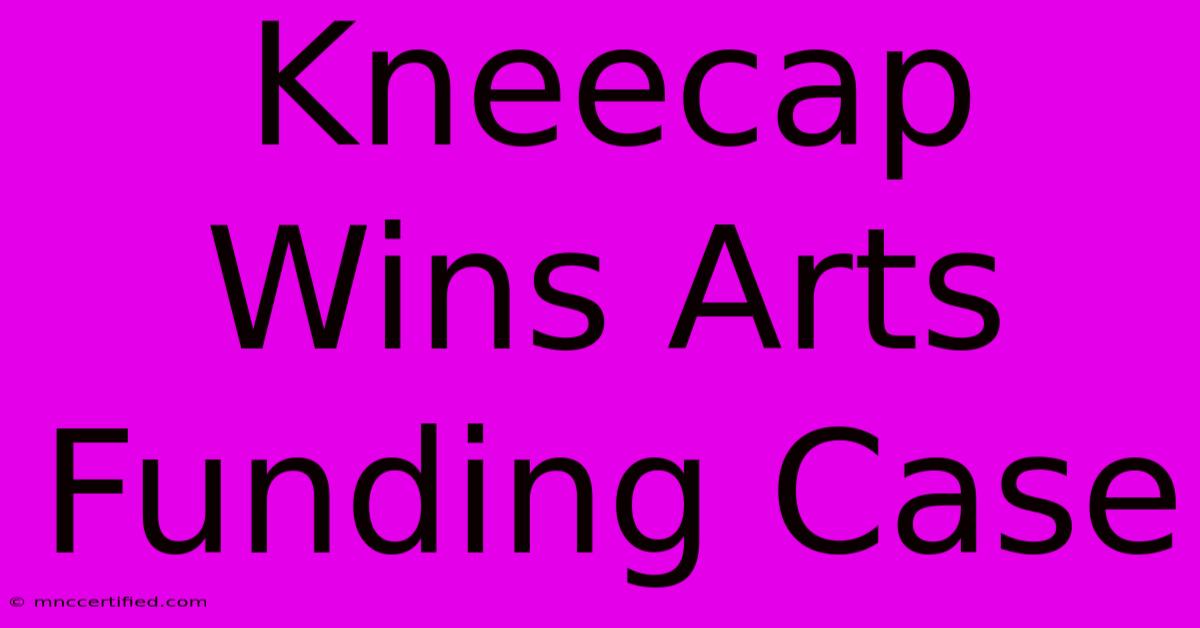Kneecap Wins Arts Funding Case

Table of Contents
Kneecap Wins Arts Funding Case: A Landmark Victory for Independent Artists
The recent court victory for the Irish hip-hop group Kneecap marks a significant win not just for the band, but for independent artists everywhere fighting for fair access to arts funding. This case highlights the ongoing struggle for equitable distribution of resources within the arts sector and the power of challenging established systems. This article will delve into the details of the case, its implications, and its potential impact on the future of arts funding.
The Background: Fighting for Funding Fairness
Kneecap, known for their politically charged and often controversial lyrics, were initially denied funding from the Arts Council of Northern Ireland. The reasons cited for the rejection remain a point of contention, with many believing the decision was influenced by the band's outspoken lyrics and their critical stance on socio-political issues. This sparked outrage amongst supporters who viewed the rejection as censorship and a violation of artistic freedom. The band, refusing to accept this setback, decided to challenge the decision legally.
Key Arguments in the Case
The legal battle centered on several crucial arguments:
- Artistic Merit vs. Political Content: The core argument revolved around the separation of artistic merit from political content. Kneecap argued that their music, regardless of its political message, possessed artistic merit and deserved consideration for funding based on its quality and impact. The Arts Council's decision, they argued, conflated political viewpoints with artistic value.
- Transparency and Accountability: A lack of transparency in the Arts Council's funding process was another key point of contention. The band argued that the criteria for funding were unclear and inconsistently applied, leading to unfair and subjective decisions.
- Discrimination against Independent Artists: The case also highlighted the challenges faced by independent artists in securing funding, often competing against established institutions with greater resources and influence. Kneecap's fight became a symbol for all independent artists facing similar obstacles.
The Victory and its Implications
Kneecap's eventual victory in court signifies a significant step forward. While the specifics of the court's ruling may vary depending on the exact details of the case (and access to the full ruling is crucial for a complete understanding), the overall impact is clear:
- Challenging Censorship in the Arts: The case sets a precedent against censorship and the suppression of artistic expression based on political viewpoints.
- Promoting Transparency in Arts Funding: It shines a spotlight on the need for greater transparency and accountability within arts funding bodies. This victory should encourage future funding organizations to be more open about their processes and criteria.
- Empowering Independent Artists: The win empowers independent artists to challenge unfair decisions and fight for their right to access funding. It sends a message that their voices and art forms are valuable and deserve to be supported.
Looking Ahead: The Future of Arts Funding
This case serves as a wake-up call for arts funding bodies across the globe. It necessitates a critical review of funding processes, ensuring fairness, transparency, and the protection of artistic freedom. The focus should shift towards evaluating artistic merit objectively, regardless of political or social commentary.
The Kneecap case is more than just a legal victory; it's a cultural moment that underscores the importance of protecting artistic freedom and ensuring equitable access to resources for all artists, regardless of their background or message. It’s a crucial reminder that art has the power to challenge, provoke, and inspire – and that this power should be nurtured, not stifled.
Keywords: Kneecap, Arts Funding, Arts Council, Northern Ireland, Independent Artists, Artistic Freedom, Censorship, Court Case, Legal Victory, Funding Transparency, Equity in Arts, Irish Hip Hop, Political Art.
Off-Page SEO Strategies:
- Press Release Distribution: Distribute a press release about this article to relevant news outlets and blogs.
- Social Media Promotion: Share the article across various social media platforms, engaging with relevant hashtags and groups.
- Outreach to Influencers: Reach out to bloggers, journalists, and social media influencers who cover arts, culture, and Irish music.
- Guest Blogging: Contribute guest posts to relevant websites and blogs in the arts and culture sector.
- Backlink Building: Seek backlinks from reputable websites and blogs related to the topic.
This comprehensive approach will help ensure the article ranks well in search engine results and reaches a wide audience. Remember to consistently update and refine your content based on performance data.

Thank you for visiting our website wich cover about Kneecap Wins Arts Funding Case. We hope the information provided has been useful to you. Feel free to contact us if you have any questions or need further assistance. See you next time and dont miss to bookmark.
Featured Posts
-
How To Add Metis To Metamask
Nov 30, 2024
-
Evan Williams Bottle In Bond
Nov 30, 2024
-
Bico Crypto Price Prediction
Nov 30, 2024
-
Ballard Mepham Sunderlands Next Defense
Nov 30, 2024
-
Car Insurance Work From Home
Nov 30, 2024